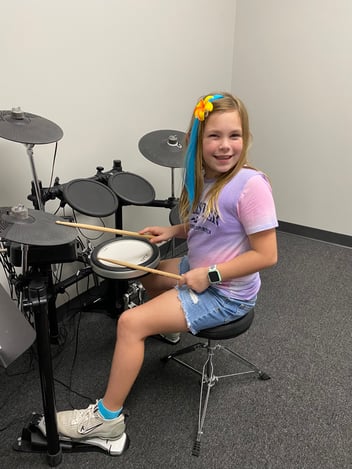Have you been looking forward to learning about drums but don't know who to ask the question, "how long does it take to learn drums?" Drums are, without question, among the most remarkable musical instruments in the music scene. For one thing, they provide the foundation and rhythm for virtually every genre of music, ranging from hip-hop to jazz to rock. Besides that, it's impressive to watch drummers create rhythms and beats with their arms, legs, and brains.
As such, drum lessons can be a wonderful and satisfying experience, regardless of background or age. They are also a great way to express imagination, manage stress, and boost your self-esteem. In addition, they can help improve physical skills and attention and foster a sense of cooperation and discipline.
While learning to play the drums can be challenging and time-consuming, the benefits far outweigh the obstacles.
Thankfully, anyone without prior musical experience can learn to play the drums if they are patient, put forth the effort, and pay attention. It's also worth mentioning that the speed of learning to play the drums, like any other musical instrument, varies from one individual to another. The best method for learning to play the drums includes the following approaches and strategies.
The Basics Of Playing Drums As A Master
There are numerous crucial components you can focus on to become a great drummer. These include improving your timing, refining your sound style, and improving your balance. The process involves the following steps:
1. Holding Your Drum Sticks
Holding your drumsticks correctly and perfecting the technique allows you to play accurately and consistently. There are numerous hand styles, including French, Moeller, and German. However, the good news is that learners can perfect any technique with training and determination.
If you focus on an approach that appeals to you, you will become adept and confident in your drumming talents. That, coupled with a good attitude and persistent practice, makes you a fantastic player.
2. Perfecting How To Time
It is just as essential to have good timing as it is to have a sense of humor when you want to become a good drummer. Without it, the rhythm can get out of sync, making the music sound discordant and causing the whole song to fall apart. Fortunately, it's possible to develop timing as a skill if you practice consistently. To keep time accurate, you don't need the precision of a robot to master it. Instead, treat time like muscle building that requires constant practice.
Using a metronome to improve timing is also an ideal traditional practice method. Start by acquiring a regular beat by following the regular clicks of a metronome. It's also worth noting that practicing with a metronome can be tiring and even sleep-inducing, but its importance to drumming is worth it.
Another technique for improving timing is practicing while listening to music. Practicing with a metronome and playing music together is essential for improving your skills- be open to trying different techniques. That said, timing is a crucial aspect of playing drums. You'll become a good drummer with the right combination of training strategies.
3. Drumming Coordination
Drumming requires exceptional coordination. So don't worry if your legs are in the wrong position or your hands are doing business elsewhere. Coordination is an acquired skill that you can improve with patience and effort. Also, drumming requires you to play complicated rhythms with multiple limbs simultaneously, which can be difficult initially. But you can improve your balance and confidently perform with focused effort and patience.
Remember that harmony is a steady process that develops over time, not a talent you can grow instantly. Accept the path, enjoy small successes, and improve your coordination skills, and you'll be able to play challenging rhythms with your body before you know it.
Accuracy is paramount when playing two cymbals or drums simultaneously. The guideline applies whether the player uses his feet, hands, or both body parts simultaneously. Harmonic sounds require precision timing, which is why training is essential. Ensure your cymbals and drums strike simultaneously to avoid an unpleasant, discordant sound. Focus on pairing each cymbal and drum correctly from the beginning.
Beyond that, each instrument should simultaneously produce a sound, without gaps or blurry noise in between, within time, precision, and accuracy. In this way, you will be successful as a drummer. Most problems drummers face are traceable to one or more of these three factors. Mastering these skills will give you a significant performance edge and position you for a successful path as a talented drummer.
What To Consider when? Practicing
Learning the most common aspects of drumming is the best way to perfect your skill. You spend 90% of your time playing grooves or drum beats as a drummer, so this is the ideal place to start. Drum fills, which take up the remaining 10% of your playing time, are less critical for beginners. Instead, focus on current drum beats relevant to the music scene. Avoid outdated or futuristic beats that have yet to catch on. Mastering the right drum beats is like a treasure map leading you to your destination. Choosing the right rhythm for a composition is essential for playing along, mainly when a drummer adds complicated fills and additions. The duty of a drummer is divided into three parts:
- First, a drummer establishes the essential rhythm that serves as the foundation for a song. Independent of all the bells and whistles, it serves as a scaffold that maintains the tempo of the rhythm.
- Once the drummer has established the foundation, they can creatively shape the rhythm to become distinctive and precisely tuned to the music.
- Then, in every measure, the drummer delivers some nifty fills that change the momentum of the melody and keep things fresh.
The most sensible way to learn to play drums is to start with the basic beat framework, which is the first. Once you understand the core of the rhythm, it's much easier to incorporate the other aspects. Novice drummers often make the beginner's mistake of trying to learn complicated rhythms before they understand the basics. It is easier to minimize irritation and misunderstanding by learning coherently.
So, instead of jumping into a song you love and starting with great drum fills, begin with simple drum beats. This will give you a solid foundation to build on, and learning more complicated rhythms will be much easier in the long run.
Want to take your musical skills to the next level? Take a look at the Music Academy of Texas in Katy, TX! Together with its sister location, Cy-Fair Music and Arts in Houston, It has become one of the fastest-growing music schools in the Houston area, TX. Thanks to our outstanding track record, we're a renowned brand. Our facility is ideal for people who live in the Katy-Cinco Ranch area. Best of all, our qualified instructors will help you achieve your goals, whether you are just starting or looking to improve your skills.
Discover our quality music lessons by visiting our website at https://www.musicacademyoftexas.com/katy-cinco-ranch to learn more about what we offer and how we can assist you.
Name, Address, and Phone
Music Academy of Texas,
25031 Westheimer Parkway Katy TX 77494,
(346) 646-5355
Social Account URLs



